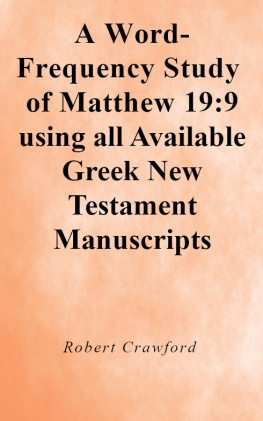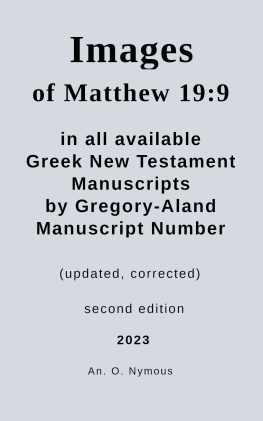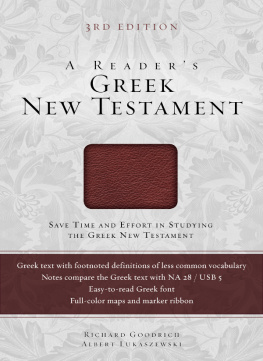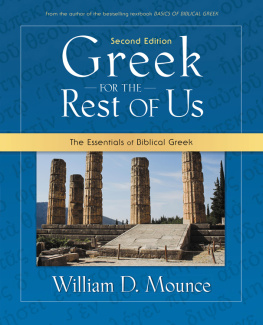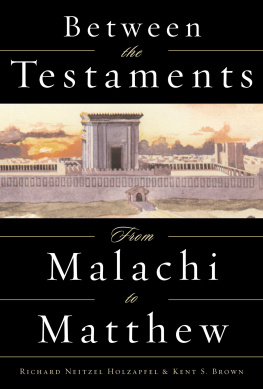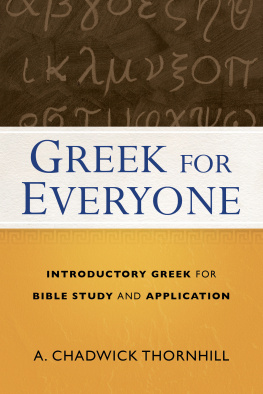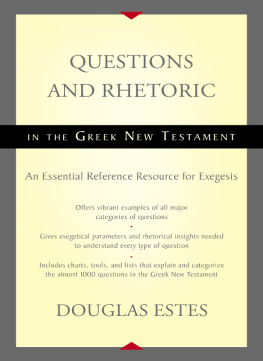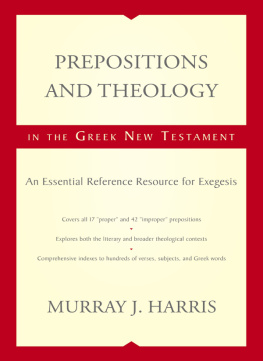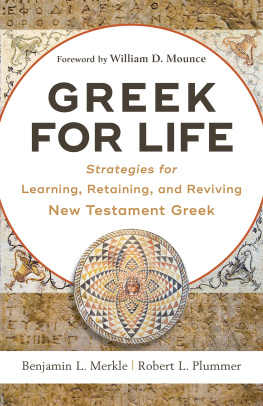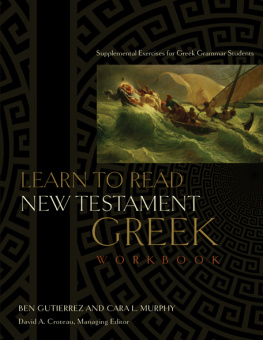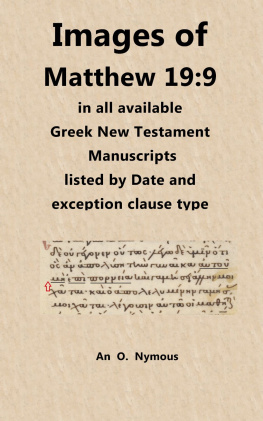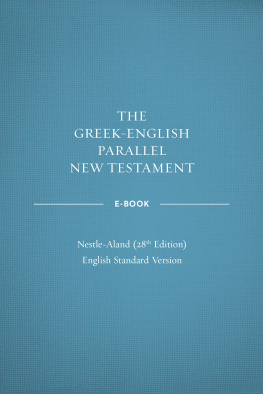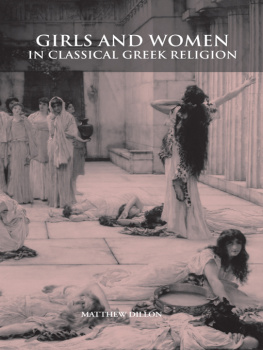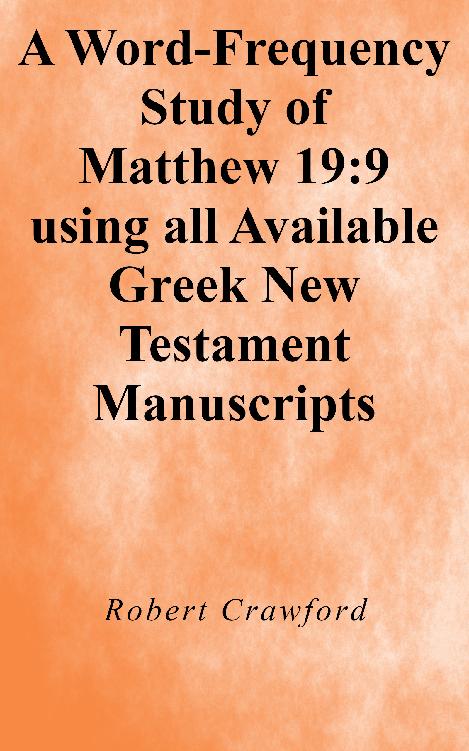Word Frequency Study of Phrase 2:
And the Rejected Words:
Word Frequency Study of Phrase 3: , .
And the Rejected Words:
Word Frequency Study of Phrase 4:
Table of Numbers of Manuscripts by Group
Table of 19 Minuscule Greek New Testament Manuscripts that Contain the Greek Word ' ' in the Infamous 'Exception Clause' of Matthew 19:9 by Manuscript Date.
Table of Manuscripts (Listed by GregoryAland Greek Manuscript Number) that are missing the last phrase: "
Table of Gregory-Aland Manuscript Numbers that include words from Matthew 5:32, inserted into Matthew 19:9
Table of Unavaible Manuscripts Listed by GregoryAland Greek Manuscript Number, that might include Matthew 19:9, but that are not accessible for various reasons including: not scanned, scanned but not readable, damaged and/or unreadable.
Matthew 19:9: Greek to English Translation by Dr. G.R. Berry (1897)
The Significance of the Greek Words: ' ' in Matthew 19:9 - a clash of confidence
Synopsis:
The Greek New Testament of Erasmus (1516) the Textus Receptus copies the second and last phrases, respectively, of Matthew 19:9, thus: "... ". The following variances exist: First, neither the Complutensian Polyglot Bible (1514), nor the NestleAland Greek New Testament (2016) (NA28) contain the Greek word . Second, the NA28 does not contain the last phrase, while the other two include it. This research is based on 1623 Greek New Testament Manuscripts, which represents about 90% of all manuscripts known to contain Matthew 19:9. The major results were: 1. the Greek word was present in only 19 (1.2%) manuscripts, and 2. the last phrase was present in 1510 (93%) manuscripts. The conclusion is that, based on word-frequency percentages, the inclusion of the Greek word in modern versions of the Greek New Testament, should be considered to be an error, and, likewise, the exclusion of the last phrase should also be considered an error. The natural consequence of the Greek word is an error is that the translation of the two-word idiom, (in Matthew 19:9) as "except" is illegitimate and therefore, Matthew 19:9 does not contain an explicitly stated exception.
Keywords: Christian; Bible; textual criticism; Matthew 19:9; Strong's 1508;
Introduction
In the early sixteenth century, the Christian Church with the project leadership .
When the Christian Church first started its project, and well before they could publish and release their Greek New Testament, the Priest and Scholar, Desiderius Erasmus decided to produce his own version of the Greek New Testament, which turned out to be a direct competitor to the Complutensian Polyglot Bible . Erasmus produced his version in a matter of months, copying from a handful of manuscripts whereas the Complustensian was produced by a dream-team of subject experts using a larger number of manuscripts. In 1516, Erasmus published his Novum Testamentum omne . The Complustensian was finished in 1514, but release to the public was delayed until 1522 due to the lengthy editing and review process. The edition of Erasmus became commonly known as the 'Textus Receptus'- a reference to words on the publisher's logo. Today, the Textus Receptus is considered to be the "Protestant" Greek New Testament, as it has had a substantial influence over almost all subsequent Protestant versions of the Bible, and is relied heavily upon to support the modern Protestant Doctrine of Divorce and Remarriage after a Divorce. Another modern version of note is the Nestle-Aland Novum Testamentum Graece (abbreviated and hereafter referred to as NA28), now in its 28th revision. It is fair to assert, for the purposes of this study, that the Complutensian and NA28 are "Catholic" versions of the Greek New Testament, and the Textus Receptus is the "Protestant" version since, Erasmus although he was a Catholic is claimed by many Protestants, to be one of the "Fathers of Protestantism". The NA28 is considered by many to be the top Critical Edition of the Greek New Testament and it is used as a basic reference source even in Protestant Theological Seminaries.
After five hundred years, these three Greek New Testament versions Complutensian, NA28 and Textus Receptus continue to be at variance. One of the most heated areas of contention are Bible texts referring to the Doctrine of Divorce and Remarriage after Divorce, especially Matthew 19:9, which is the Protestant keystone text used to justify their practice of Divorce and Remarriage. Now that many Greek New Testament Manuscripts (hereafter referred to as "manuscripts" or MSS) are becoming available online, we have new resources to help us to shine a light on the variances between these three great versions of the Greek New Testament. Along with these digital resources, we can also rely on the doctrine that copying errors in the Manuscripts are a rare occurrence and the true text can be ascertained by a multitude of Manuscript witnesses. In practical terms, this doctrine means that when there is a disagreement between manuscripts, we should favour the text of the numerical majority. This doctrine is effective in weeding out copying errors and the odd error of a careless copyist.

